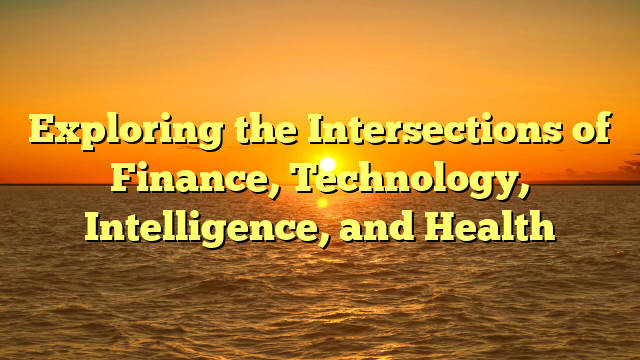—
webini33 of finance, technology, intelligence, and health are key pillars that define the progress of modern civilization. As they evolve, they continue to intersect in ways that create new opportunities and challenges. This article examines how each of these fields is advancing and how they are contributing to a better future.
Finance: The Changing Landscape of Global Economies
Finance has experienced profound shifts over the last few years. Technological advancements such as blockchain, digital currencies, and AI-driven analytics have disrupted traditional financial systems. Decentralized finance (DeFi) has emerged as a powerful force, offering new ways for individuals and institutions to access financial services and invest in global markets.
The fintech boom is redefining personal finance. With the advent of mobile apps, blockchain-based platforms, and AI-driven investment tools, individuals now have greater control over their finances than ever before. Digital banking and micro-investing platforms have made it easier for people to save and invest, often with lower fees and greater convenience.
Technology: The Catalyst for Change
At the heart of the transformation in finance, intelligence, and healthcare lies technology. Innovations such as artificial intelligence, machine learning, and the Internet of Things (IoT) are enhancing productivity, reducing costs, and improving outcomes. AI, for instance, is increasingly used in the financial sector to automate processes and predict market movements. In healthcare, machine learning algorithms are helping doctors diagnose diseases with greater accuracy.
The advent of cloud computing has revolutionized data storage and processing, providing businesses with the tools to make more informed decisions. In the financial sector, this technology is helping companies manage vast amounts of data, analyze trends, and develop predictive models. In healthcare, the cloud is improving communication among professionals and enabling more personalized treatments for patients.
Intelligence: The Role of Artificial Intelligence in Shaping the Future
Artificial intelligence (AI) is rapidly changing the landscape of multiple industries, including finance, healthcare, and beyond. In finance, AI is used to optimize investments, identify market patterns, and reduce human error. In healthcare, AI-powered tools are improving diagnostic accuracy and enabling personalized treatments that are tailored to a patient’s unique genetic profile. The integration of AI into these fields is enhancing both efficiency and outcomes.
However, the widespread use of AI raises ethical concerns, particularly regarding privacy, job displacement, and biases in algorithmic decision-making. As AI becomes more prevalent, there is a growing need for regulatory frameworks to ensure that these technologies are used responsibly and ethically. It is essential for policymakers to address these challenges while harnessing AI’s potential to drive innovation and improve quality of life.
Health: The Intersection of Technology and Well-being
Health technology is evolving rapidly, enabling more personalized and effective treatments. Advances in genomics, AI, and wearable devices are helping doctors tailor treatments to individual patients, improving outcomes. Wearable health devices like fitness trackers are also playing a key role in helping people maintain their health and fitness levels, providing real-time feedback on vital signs like heart rate, steps taken, and sleep patterns.
The integration of telemedicine has been a game-changer in improving healthcare delivery. Especially during the COVID-19 pandemic, virtual consultations became a vital tool for connecting patients with doctors. Telemedicine offers convenience and accessibility, particularly for those who live in underserved areas or have mobility challenges. With the growing use of telehealth platforms, healthcare is becoming more efficient and easier to access.
—
To conclude, the ongoing developments in finance, technology, intelligence, and healthcare will have a transformative impact on society. As these fields continue to progress, their interconnectedness will lead to more efficient, personalized, and accessible services. The future is bright, with endless possibilities for how these domains will contribute to a healthier, more sustainable world.
